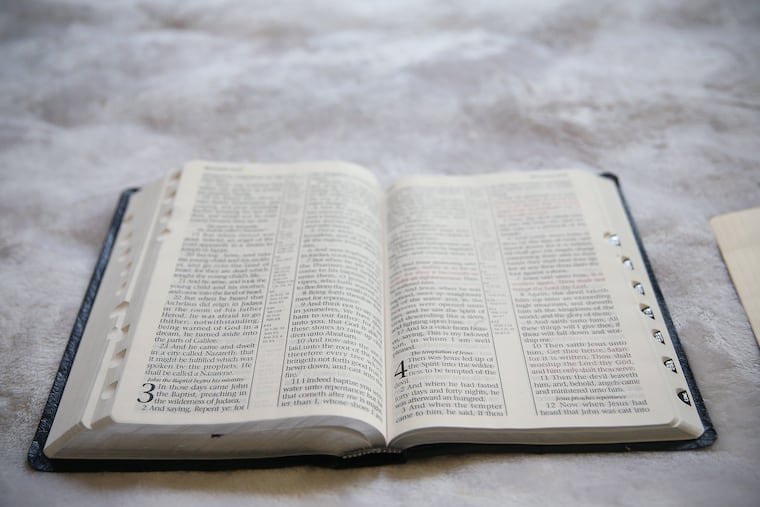To better understand the Constitution, read your Bible | Opinion
If we miss or dismiss the Bible's contributions to the American constitutional tradition, we distort our understanding of the nation's bold experiment in republican self-government and liberty under law.

As Constitution Day draws near, it's worth remembering not only our founding charter, but also an often-overlooked source of its ideas.
The Bible.
Yes, the United States was founded during an age of Enlightenment when rationalism was, for some elites, in the ascendency and revelation was relegated to the sidelines. And yes, the founders drew inspiration from multiple sources, including British constitutionalism, Enlightenment liberalism, and classical and civic republicanism.
If we miss or dismiss the Bible's contributions to the American constitutional tradition, we distort our understanding of the nation's bold experiment in republican self-government and liberty under law.
Not all founders revered the Bible as divine revelation, but even the skeptics among them considered it useful in framing new constitutional republicans. Notwithstanding their diverse backgrounds and personal religious beliefs, the founders valued the Bible for its insights into human nature, civic virtue, social order, political authority, the rights and duties of citizens, and other concepts essential to framing a new political society.
There was, in particular, a consensus that the Bible was essential for nurturing the civic virtues that give citizens the capacity for self-government in a republic. For this reason, both John Adams and John Dickinson called the Bible "the most republican book in the world."
Some founders also saw in Scripture political and legal models they believed enjoyed divine favor and were worthy of emulation.
The U.S. Constitution reflects a political vision informed, in part, by the Bible and contains features familiar to a Bible-reading people. Although it is difficult to establish definitively that constitutional provisions were derived from specific biblical passages, the lineage of selected constitutional principles can be traced back to biblical concepts that had previously found expression in western legal tradition, especially in the English common law, as well as in colonial laws and customs.
Consider:
The Constitution's basic design, defined by the separation of powers and checks and balances, reflected an awareness of original sin and the necessity to guard against the concentration or abuse of government powers vested in fallen human actors. This biblical anthropology was expressed in the Constitutional Convention, when James Madison said, "The truth was that all men having power ought to be distrusted to a certain degree."
Another constitutional provision, Article IV, section 4, mandates that every state maintain "a Republican Form of Government." Many in the founding generation believed the Hebrew commonwealth during the years between the exodus and Saul's coronation provided a divinely inspired model for republican government. In an influential 1775 Massachusetts election sermon, Samuel Langdon, then Harvard College's president, opined: "The Jewish government, according to the original constitution which was divinely established … was a perfect Republic" and that "at least some principal laws and orders of it may be copied, to great advantage, in more modern establishments." This republic, proponents claimed, promoted notions like government deriving its authority from the consent of the governed as exercised through representatives of the people.
The Article III, section 3 requirement that convictions for treason be supported by "the testimony of two witnesses" conforms to a familiar biblical mandate for conviction and punishment (see: Deuteronomy 17:6).
The Fifth Amendment, framed by the first federal Congress, prohibits double jeopardy, or trying a defendant twice for the same offense. In a late fourth-century commentary, Saint Jerome (and legal scholars ever since) said this was a principle found in the book of the prophet Nahum 1:9, and it was eventually enshrined in the western legal tradition.
Legal scholars have identified additional constitutional provisions that were influenced by the Bible. These include measures addressing due process of law, Sunday observance, cruel and unusual punishment, affirmation in the alternative to an oath, and corruption of blood.
"Now historians are discovering that the Bible, perhaps even more than the Constitution, is our founding document," Newsweek reported in a cover story on the Bible in America. In an increasingly secular age, the Bible's role in the nation's founding is much contested. The evidence suggests, however, that the Bible is among the sources that informed the American constitutional experiment.
This Constitution Day, read the Constitution. And to better understand the Constitution, read your Bible.
Daniel L. Dreisbach will lecture at the National Constitution Center on Oct. 18 about "Faith and the Founding: The Bible and the Constitution." He is a scholar adviser to the Faith and Liberty Discovery Center, a professor at American University in Washington, and author of Reading the Bible with the Founding Fathers (Oxford, 2017).